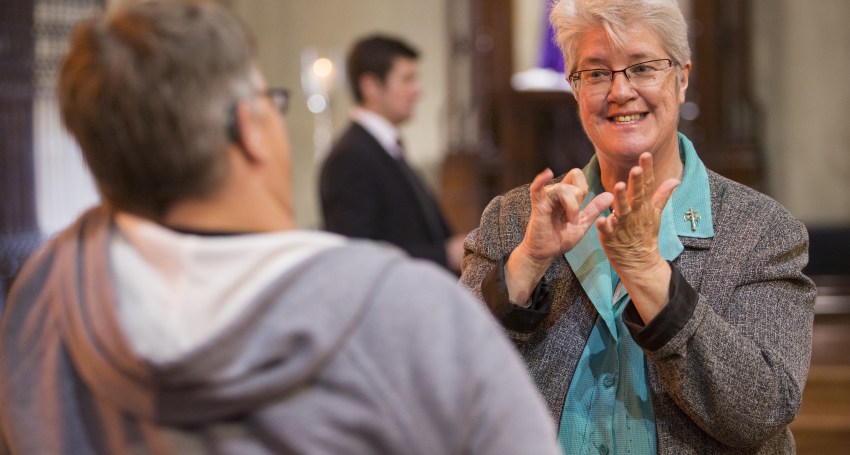Helping people with disability access sacraments
News
A new website is helping to ensure people with disabilities can prepare for and participate fully in the sacramental life of the Church.

Launched by the Australian Catholic Disability Council in late March, the website is an extension of the Australian Catholic Bishop’s Conference’s document, Celebrating the Sacramental Life from Birth to Death: Guidelines for the celebration of the Sacraments with People with Disability.
The website draws on local and international content and for the first time, provides a suite of materials in one place. It includes general principles for supporting people with disability, as well as specific documents for preparation and celebration of individual sacraments.
Advertisement
Bishop Terry Brady, the Bishops’ delegate for Disability Issues, said priests, pastoral workers and teachers who don’t have experience walking alongside people with disability were sometimes “anxious or unsure” about how to best support their faith life.
“Our Church is a Church that’s called to be welcoming and inclusive to all. This website gives parishes, schools and families important information so they can answer that call,” he said.
“If someone hasn’t had much exposure to young people living with autism or a young adult with Down syndrome they can often be cautious and despite the best intentions, struggle to adequately feed their faith.
“We are called to be inclusive parishes and schools and communities that warmly welcome and acknowledge people with disability and their families on the journey of faith. Let us become communities where the presence of Jesus Christ is recognised in everyone, where we can all participate and journey together in the rich life of our Church.”
Chris Lemon from St Patrick’s Special School in Dulwich said she was very interested in utilising the new Australian website as the school currently accesses a variety of resources, including an American series of adaptive kits from Loyola Press.
Advertisement
“Supporting students with intellectual disabilities to fully participate in the sacramental life of their parish community involves an individualised approach,” she explained.
“This includes the creation of resources for home such as social stories, programming communication applications, liaising with parishes and extending the preparation time.
“We work closely with each student and their family to ensure that the entire process is empowering and inclusive.”
Family and parish based catechesis consultants Sr Jenny Seal and Carmen Balales said the website complemented the Archdiocese’s policy, Sacraments of Initiation for Children and Infants, which includes guidelines for the sacramental participation in Confirmation and the Eucharist of children with intellectual disabilities.
In part, the policy says: “The local Church models itself on the example of Jesus as it seeks to express unqualified love, acceptance and inclusion of all people. The acceptance and inclusion of young people with intellectual disabilities in the life of the worshipping community are important to their family’s faith and sense of belonging. As baptised members of the Church, children with an intellectual disability have access to full initiation in the Catholic Church if it is the desire of the child and their family, who can call on the support of the broader Catholic community, that is, parish and school.”
Ms Balales said when children and their families present for the Sacraments of Initiation they experience a “sense of welcome, hospitality and inclusivity”.
“Their desire for Jesus is nourished and grown in the experience of the preparation process that is part of the Sacraments of Initiation,” Sr Seal added.








Comments
Show comments Hide comments